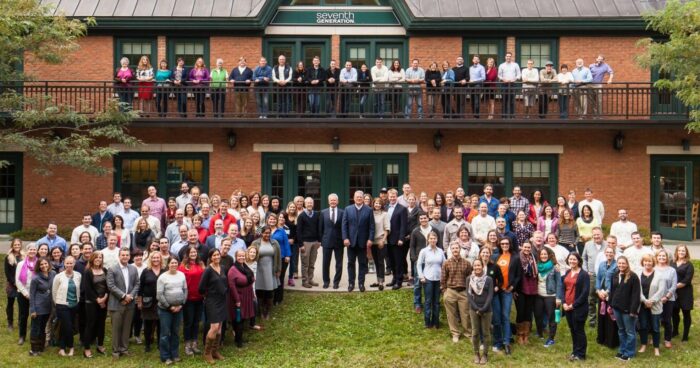
Sustainability has become a major consideration in consumer purchasing decisions. Buyers want to know where the things they buy come from and how they’re packaged and transported. They inquire about the working conditions of those who make products and what resources were expended to manufacture them.
Ethical sourcing of materials, eco-friendly manufacturing, and keeping products out of landfills at the end of their life define sustainability. Buying such products is healthier for the consumer and the planet.
Consumers are increasingly demanding that companies operate with core sustainability practices. That means more than figuring out how to earn carbon credits or donating money to environmental organizations. They’re not just seeking environmentally friendly companies, but companies truly committed to sustainability practices at every level.
It costs more to practice sustainability, and that premium is passed along to the consumer. Yet a growing number of them are happy to pay more for the privilege. A 2024 First Insight survey found that 68% of consumers would be willing to pay extra for a sustainable product. In fact, nearly three-quarters of those surveyed said that sustainability was either a very or somewhat important factor in their purchasing decisions.
That said, eco-minded consumers are asking for concrete evidence of a company’s sustainability cred. They aren’t fooled by corporations that merely pay lip service to the principle without following up in practice.
Sustainability is a core philosophy for those companies committed to it. Here are four that are setting the standard for sustainability practice.
1. Puris

What if you could trace the provenance of a protein you consume back to the soil? Moreover, what if, at every step from seed to processing to packaging, all inputs were pure and organic? That’s what Puris is all about.
Puris was founded in the 1980s to develop safer and more sustainable foods from plants. It developed disease-resistant non-GMO seeds that would produce a pure, organic source of protein.
According to Puris, plant-based protein is the future of human nutrition worldwide. The company works with a network of independent farmers dedicated to non-GMO practices. The company extracts every ounce of nutrition from soybeans, lentils, pulses, and corn.
Puris processes these materials in isolated milling operations and uses environmentally friendly packaging. It sells both directly to consumers and in bulk to food companies that use its pure ingredients. It’s a purely sustainable end-to-end plant-based food operation that’s good for the earth, farmers, and consumers.
2. Aspiration Financial, LLC

It might seem more difficult for a financial services company to work from a core philosophy of sustainability. But Aspiration is one such company that does. Its goal is to build a community that will save the planet.
Aspiration markets itself largely as the company that plants a tree every time you use its credit card. It’s true that it is currently reforesting in the U.S., Honduras, Brazil, Madagascar, Mozambique, and Kenya. But the company is doing considerably more to practice and encourage others to practice sustainability.
The company’s Aspiration Impact Measurement (AIM) offers a way to score its customers’ environmental impact. It does so by assessing the sustainability of companies customers do business with. AIM embeds sustainability scores into customer transactions so consumers can make more informed purchasing decisions.
But wait, there’s more. Aspiration does not invest in fossil fuel companies or others with poor environmental records. And using its debit card when buying gas spurs an automatic carbon offset.
3. Allbirds

Allbirds makes all sorts of apparel out of natural and sustainable fibers. But it’s probably best known for its shoes, made from eucalyptus tree fiber, Merino wool, sugar cane, and natural rubber. This is a company that takes eliminating its carbon footprint literally.
Allbirds candidly admits that the fashion industry overall is a major planet destroyer. The industry dumps 2.1 billion metric tons of carbon dioxide into the atmosphere annually. The company believes you can produce shoes and clothing without obliterating the planet.
Allbirds has set a zero-carbon footprint goal by 2025. Materials, manufacturing, transportation, product use, and end of life are included in its calculus. The company is committed to using renewable materials, regenerative farming practices, responsible energy, and carbon offsets.
Goals include 100% use of renewable energy in all Allbirds facilities and partner manufacturers and shipping 95% of its goods by sea. The company is also counting on consumer responsibility. It hopes to have 100% of customers washing their Allbirds apparel in cold water and 50% hanging them to dry.
4. Seventh Generation

Seventh Generation named the company for its commitment to its core philosophy. It aims to create a healthy, sustainable, and equitable world for the next seven generations. It launched this mission when the cleaning products company was founded three decades ago.
The company operates by what it calls the Seventh Generation Principle of Precaution. It involves reducing risk to the planet and the people on it in every way it can. That begins with using biodegradable ingredients in its products and packaging that are both recyclable and made from recycled materials.
Seventh Generation is a corporate activist for climate justice and equity. Its Social Mission Board comprises sustainability leaders outside the company who recommend aggressive environmental goals. The board also pushes the company to increase the diversity of its workforce.
This is a company founded on the belief that business can change the world for the better. Purchased by Unilever more than six years ago, Seventh Generation is pushing the corporate behemoth to also do better. This once small company is cleaning up the planet, one product at a time.
Sustainable to the Core
These companies share a core philosophy of not making the world a worse place for the sake of turning profits. They also share a commitment to transparency in their operations from the boardroom to the landfill.
In a world awakened to the devastating effects of climate change, consumers are taking steps to do better. They’ve realized that if they’re not buying from companies committed to sustainability, they’re part of the problem, not the solution. And if that costs them a little more money, it’s a worthy investment.








